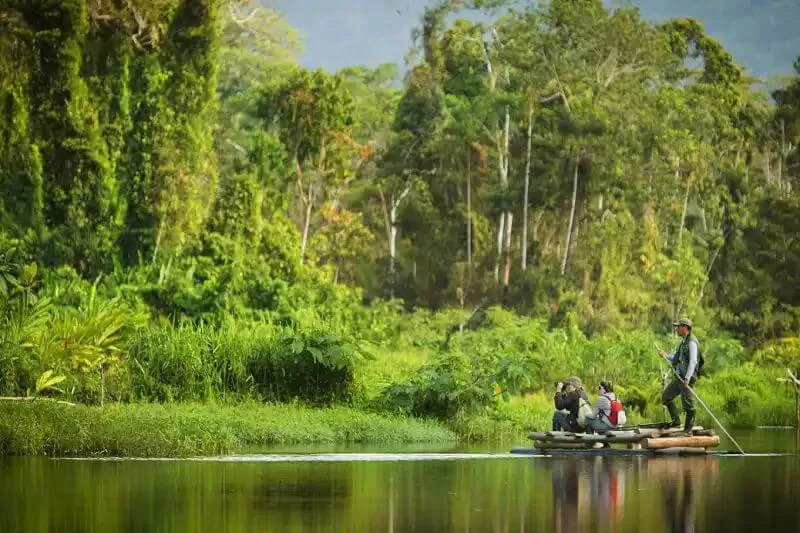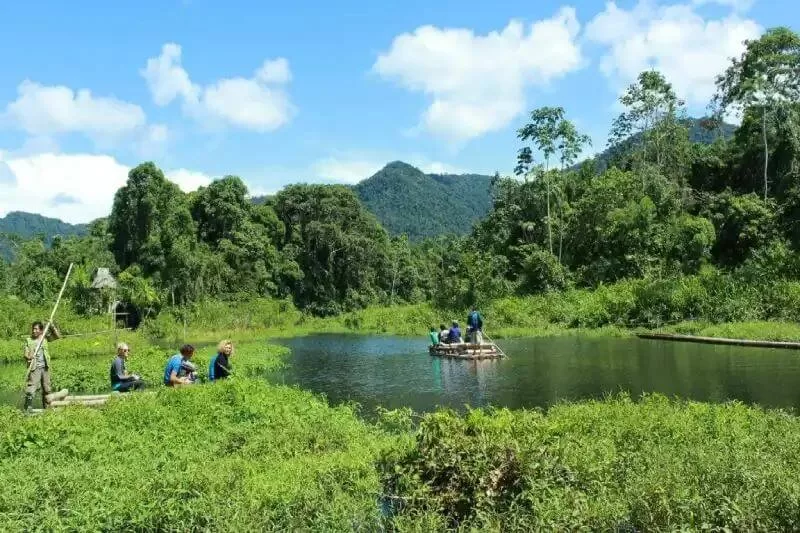Many visitors in Manu National Park understand the importance of conservation. But how to make sure your journey is a real eco-friendly tour? In particular if there is not that much regulation into what is or it’s not an eco-friendly tour.
The rise of greenwashing has clouded the eco-tourism landscape. Many claim sustainability, but few practice what they preach. Discerning the authentic from the facade becomes crucial.
We want to guide you into finding an actual ecological tour. We delve into what truly makes a tour eco-friendly. Our insights aim to give the capability of making informed decisions.
Join us as we uncover the real eco-tours of Manu. Learn how to spot those who prioritize the environment. Nature lovers will agree that every effort of conservation is valuable. Especially those that you make when visiting Manu.
In the realm of travel, sustainability has become a pivotal concern. True eco-friendly practices go beyond mere labels. They encompass a comprehensive approach to preserving our planet.
Real eco-friendly tours embody this. They strive to minimize environmental impact. Every aspect, from transportation to lodging, aligns with sustainability.
Such tours prioritize the conservation of natural resources. They support ecosystems like national parks and cloud forests. This commitment is vital for preserving biodiversity.

Firstly, real eco-friendly tours reduce carbon emissions. They use sustainable modes of transport. This approach significantly lowers the carbon footprint.
Secondly, they engage local communities. This includes hiring local guides and supporting indigenous businesses. Such practices ensure that tourism benefits the local economy.
Additionally, these tours operate in small groups. This minimizes the impact on the environment. It also enhances the experience for travelers.
Real eco-friendly tours offer immersive experiences. They take travelers into the heart of natural habitats. This includes places like Manu National Park.
Here, visitors can explore reserved zones and lowland rainforests. They learn about the flora and fauna from knowledgeable guides. This education is a cornerstone of sustainable tourism.
Furthermore, these tours foster a connection with indigenous people. They provide insights into traditional lifestyles. This cultural exchange is an enriching aspect of responsible travel.
Adopting sustainable travel practices is crucial. Real eco-friendly tours demonstrate how to travel responsibly. They show the importance of reducing one’s carbon footprint.
These tours also highlight sustainable living techniques. This includes everything from water conservation to waste reduction. Travelers can apply these practices in their daily lives.
Moreover, choosing real eco-friendly tours supports conservation efforts. It contributes to the preservation of natural and cultural heritage. This is essential for future generations.
Selecting tours that follow these principles is important. It’s a way to ensure that travel has a positive impact. Tour operators who offer real eco-friendly tours prioritize the planet and its people.
These operators also focus on sustainable travel practices. They are committed to making a difference. This commitment is evident in every aspect of their tours.
In the world of travel, “sustainable” is a buzzword. But not all claims hold true. Understanding what makes a tour truly sustainable is key.
Real eco-friendly tours go beyond just minimizing carbon emissions. They embrace a holistic approach to sustainability. This includes environmental, social, and economic aspects.
Such tours actively contribute to conservation efforts. They support wildlife and habitats. This commitment ensures the protection of natural resources.
Tour operators play a crucial role in this. They design tours that respect the natural environment. These tours avoid the overuse of natural resources.
A real eco-friendly tour uses local guides. This practice supports the local economy. It also enriches the travel experience with authentic insights.
Transportation is another critical factor. Sustainable tours opt for low-impact options. They prioritize walking, biking, or using electric vehicles.

Real eco-friendly tours foster connections with local people. They involve indigenous communities in tourism. This approach provides travelers with a deeper cultural understanding.
These tours ensure that tourism benefits reach local hands. They buy from local vendors and eat at local eateries. This strategy reduces the carbon footprint associated with importing goods.
Moreover, real eco-friendly tours educate travelers. They spread awareness about sustainable travel practices. This education encourages responsible behavior during and after the tour.
Manu National Park serves as a prime example. Here, tour operators execute real eco-friendly tours. They showcase the park’s stunning cloud forests and diverse flora and fauna.
Tourists learn about the importance of conservation. They see firsthand the efforts to maintain the balance between tourism and nature. This experience fosters a greater appreciation for the natural world.
Choosing real eco-friendly tours is a step towards sustainable travel. It’s about making informed choices. These choices can significantly reduce a traveler’s environmental impact.
Sustainable tourism is about preserving the wonder of the world. Real eco-friendly tours embody this principle. But sustainability goes beyond. Looking for eco-friendly accommodations is also possible,
By supporting these tours, travelers contribute to a greener, more sustainable future. They help protect cherished destinations and the planet. This commitment is the essence of responsible travel.
In today’s eco-conscious world, “sustainability” often features in the brochures of tour operators. Yet, the essence of a real eco-friendly tour delves much deeper than mere advertising. It embodies practices and principles that significantly reduce the carbon footprint, fostering an environment of responsible travel.
At its core, a real eco-friendly tour minimizes environmental impact. It does so by employing sustainable travel practices. These include using renewable energy sources and reducing waste.
Moreover, true sustainability involves supporting the local ecosystem. This means not just enjoying the flora and fauna but also contributing to their conservation. Tours that engage in these practices offer a model for sustainable tourism.
Real eco-friendly tours also prioritize the well-being of local communities. They ensure that tourism benefits are shared with local people. This approach fosters mutual respect and understanding.
A hallmark of real eco-friendly tours is the use of local guides. This choice provides employment opportunities and keeps the knowledge within the community. It also enhances the travel experience with authentic cultural insights.
Another aspect is choosing low-impact transportation. Sustainable tours opt for walking, cycling, or using electric vehicles whenever possible. This strategy significantly reduces carbon emissions.
Sustainability extends to accommodation choices as well. Eco-friendly tours select lodgings that follow sustainable practices. These establishments often utilize solar power and have waste reduction measures in place.
In areas like Manu National Park, real eco-friendly tours take travelers into the heart of the reserved zone. Here, the emphasis on low-impact travel is crucial. It preserves the park’s untouched cloud forests and rich biodiversity.
These tours offer more than just a glimpse into the natural world. They educate travelers about sustainable practices. This education is vital for the ongoing conservation of such pristine environments.
Additionally, real eco-friendly tours involve interaction with indigenous people. This engagement allows for a deeper understanding of the cultural zone. It emphasizes the importance of preserving traditional ways of life alongside natural habitats.
Choosing real eco-friendly tours means making a commitment to responsible travel. It’s about understanding the impact of one’s carbon footprint. Such tours encourage practices that travelers can carry with them, promoting sustainability beyond the duration of the trip.
The focus on sustainable travel practices extends to every aspect of the tour. From dining at local eateries to supporting artisan markets, every choice is made with sustainability in mind. This holistic approach ensures that the benefits of tourism extend throughout the community.

If you got any questions, please do not hesitate to send us a message. We reply within 24 hours!
+51 900 394 399
info@biomanuexpeditions.com
reservas@biomanuexpeditions.com
